Being John Malkovich: From Hollywood's cool villain to playing a pope
John Malkovich knows that he intimidates people. The pouting sneer and softly drawling speech that brand him such a good villain on screen are fatigued direct from real life.
Every bit I stand waiting in his luxurious simply by and large empty suite at the Beverly Hills Iv Seasons, people keep telling me not to worry and repeating that he is, in fact, very nice. When Malkovich walks in they all scarper.
Given that the actor is best known for playing menacing roles in films such as Dangerous Liaisons and Con Air, forth with a tormented version of himself in Being John Malkovich, it makes sense that people might forget where the characters finish.
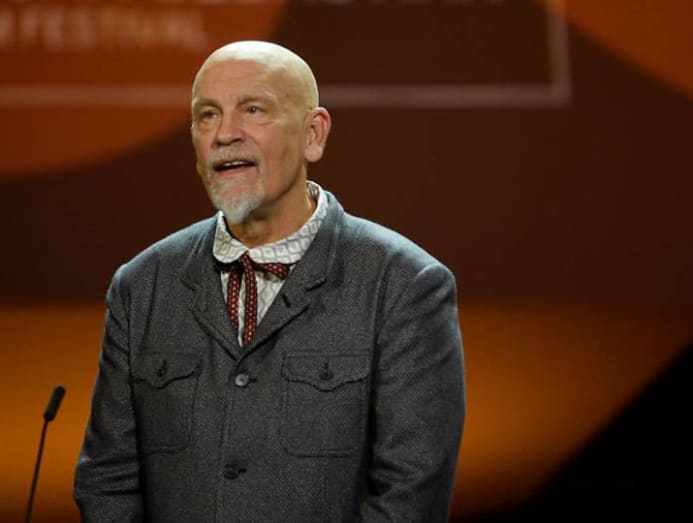
Non that he cares. "I've been quite heavily characterised and categorised. It doesn't mean much to me," he shrugged.
"Even when I was young I didn't actually intendance." This attitude probably came from his family. "I was raised that I was responsible for myself, period. From the time I could comprehend language it wasn't a matter of what my parents said. They told me I was responsible for myself."
Now 66, he is tall and physically imposing but smiles often and speaks so softly that I have to lean in to hear him. He is also more droll than his roles might suggest – quick to undercut his own seriousness with a "big deal" or "so what".
In his loose blue jacket, he looks improve suited to lead a grade at Philippe Gaulier's clown school than sit through a Hollywood press interview. Given how often he turns the chat towards theatre and stagecraft, that may exist what he wishes he was doing right at present.
Even so, while Malkovich might prefer to talk well-nigh himself as a jobbing player and director, Hollywood continues to tap him for leading roles – hence the 4 Seasons suite and general hubbub outside.
The latest is Sir John Brannox, an eyeliner-wearing, three-piece-suited English aristocrat turned pontiff, in The New Pope. Launching in January, the Boob tube serial is a follow-up to The Young Pope, which starred Jude Law as a fictional, US-born pope who smoked, worked out and drank Ruby-red Coke Nothing for breakfast.
Creator Paolo Sorrentino, the Italian manager known for such films as The Great Dazzler and The Consequences Of Dearest, said that he wanted to make something every bit splendid every bit the Cosmic Church itself. Like its predecessor, The New Pope is gorgeous to expect at and completely mad to spotter.
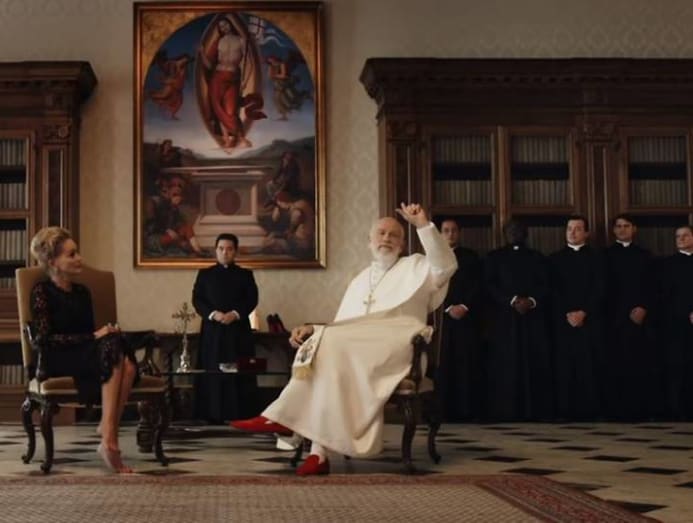
Sorrentino's style and storytelling were the draw, said Malkovich. "I liked that (the first series) interested me in something – religion in general and Catholicism in particular and the Vatican itself to be overly specific – in things that I accept no interest in, no didactics in at all, and no item curiosity about."
For the uninitiated, the series can also act as a study in organised faith via Sorrentino'south lens. "I realised that in this earth there's so much kind of mysticism, spirituality, abuse, refinement, debasement – a kind of microcosm of life itself," said Malkovich, who is an atheist. "Only then, on the other hand, what do y'all expect? They are humans. No 1's exempt."
ELEGANT AND MYSTERIOUS
At the offset of his film career, Malkovich sometimes seemed frustrated. A fiery interview in the early 1990s quoted him as existence unhappy that his performances were at the mercy of edits. This attitude seems to have softened – or at least he has decided at that place is nil to proceeds from voicing information technology to a journalist.
When I ask what instructions Sorrentino offered, he says in that location were none, simply that they were not necessary given the director's visuals and highly stylised, symmetrical framing. "The affair about Paolo that's sort of inescapable, that'due south immutable actually, are his shots," he said. "They dictate everything actually. They even interpret the script that you mayhap thought you lot had interpreted until you lot saw the shot."
Just every bit Charlie Kaufman wrote the screenplay for the 1999 film Beingness John Malkovich with the actor in heed, Sorrentino – who calls Malkovich elegant and mysterious – claims to have shaped the function in The New Pope after they spent time together at the director'southward home.
You can picture for yourself what that experience might have been like from the dialogue Sorrentino went on to write. In one scene, Malkovich greets a visitor with: "So here nosotros are, faced with the frightful chore of having to converse."
When I ask whether it is foreign to read versions of himself in tearing or seductive roles, Malkovich claims not to see it. "I thought (Existence John Malkovich) was very funny when I read it. In fact, I wanted to direct it. I wanted to straight it and we were going to produce it." He was and so dissociated from the role that he idea of Sean Penn or (and it is hard to tell here if he is joking) William Shatner – Captain James T Kirk himself – for the central part.
Happily, the script stayed as information technology was, Spike Jonze directed and the film was greeted as 1 of the all-time of the year.
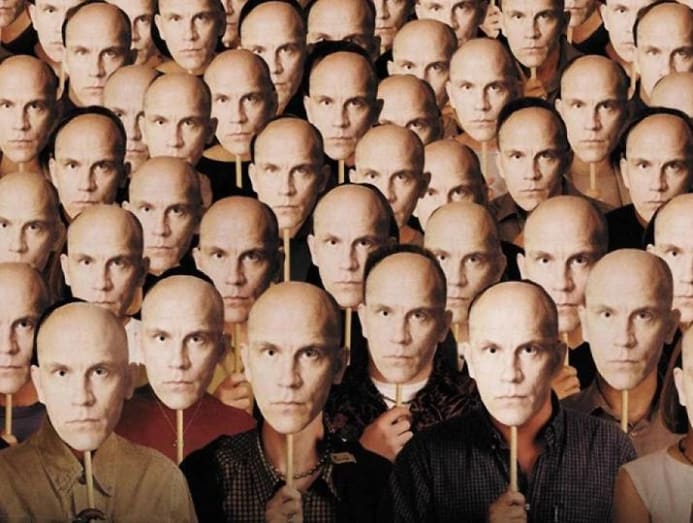
A screening of the first two episodes of The New Pope at the Venice film festival in September also received fantabulous reviews, with Malkovich in particular applauded for his functioning.
This is a feature in his work, regardless of the production. He has been Oscar-nominated twice but there are some duds in his CV. Tardily last year he starred in Bird Box – ane of Netflix's most successful original films. A few months later he appeared in David Mamet's widely derided play Bitter Wheat, starring as a predatory Harvey Weinstein-similar producer. The FT praised his operation but called Mamet's drama ill-judged.
"The play generated some degree of . . . ah . . . controversy and disdain," he said. "And so what?" He knows critics have a job to do. If they don't like something, they don't like it.
This equanimity is not, however, something he extends to social media. "People were terribly upset – some, obviously – on social media, by the notion that a play fifty-fifty could or might upset people." This he considers intolerable. "That's what I refer to as fascism. Pure totalitarianism."
Was he concerned about playing a office linked to someone people experience and then strongly almost and who is still alive?
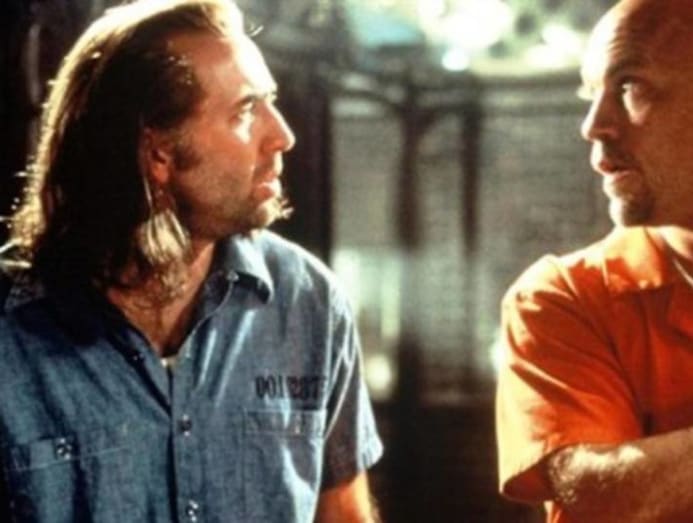
He considers this for some fourth dimension earlier claiming that no, he was non concerned. Considering he acted in the play rather than sat in the audience, he cannot judge what the experience was like, simply he is convinced that some of the negative reaction was linked to the play'southward existence rather than its execution.
Pausing again, he goes on a detour that manages to be both thoughtful and provocatively dismissive. "It's storytelling," he said. "It's that simple. There was outrage when it was released. My agents were concerned about the notion of information technology. How dare this old white Jewish homo write a play about essentially an old white Jewish man as if the but play written nearly it should exist from the perspective of a victim. Nosotros had many people who were purportedly . . . let'due south say 'bathrobed' . . . come to the play who enjoyed information technology profoundly. I'yard sure other people who have been bathrobed, or worse, could very easily have been enraged, upset, felt belittled or traumatised by it. I understand that."
If he knew a friend'due south life story and knew that something had happened to them that might make seeing a certain play upsetting so, yes, he might say something. But it is not possible to make that determination for strangers. Nor should information technology be. He recalls being asked years agone why his production of Hysteria, a farce based on Freud's terminal days, did not come with a warning. The memory leads to a full-strength Malkovich soliloquy.
"Who am I to put a trigger alarm on?" he said. "Who am I to say, 'Yous'll be triggered by this'? Possibly you'll recall it's hilarious. Maybe y'all'll walk out. Maybe you'll exist bored senseless. How pretentious." He stops for a moment, and then carries on slowly, each word dripping with disdain.
"How incredibly presumptuous to say I'll understand what 80 or 300 or i,500 people will feel. How idiotic. How outrageous. It's outrageous that people demand it. How kittenish. How babyish. But go ahead."
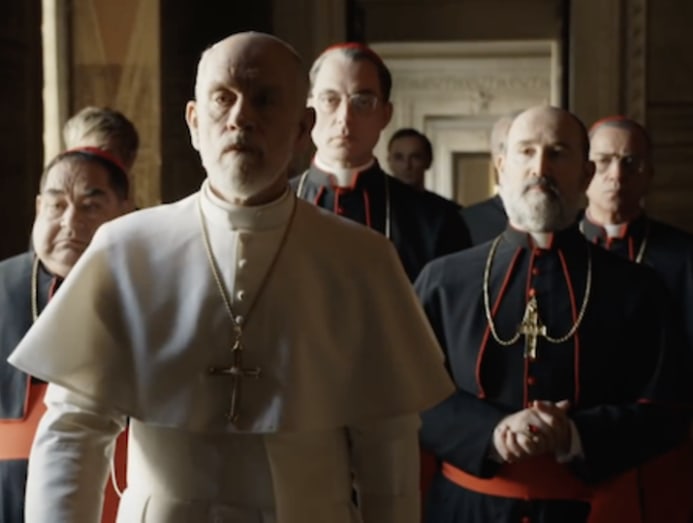
Malkovich'southward power to unleash his anger is hypnotic on film. Witnessing information technology in real life is just as mesmerising – even a polite, perfectly equanimous version. The last line is delivered with a dismissive smile. This is the indicate in the film where I think his dazed opponent would either faint or run away.
YOUTH Full OF Conflict
Raised in a small-scale town in Illinois, Malkovich is 1 of five siblings. He has talked of his youth equally being total of conflict – something he seemed able to dip into as an thespian when he joined the Steppenwolf Theatre Company in Chicago in 1976 and later on moved to Broadway, Television set and film.
But a handful of actors manage to appear coolly above the movie concern while simultaneously condign world-famous and starring in multimillion-dollar, box-role hits. Malkovich has always seemed less drastic for the accolades of film success than his contemporaries.
That, of class, has made audiences like him even more.
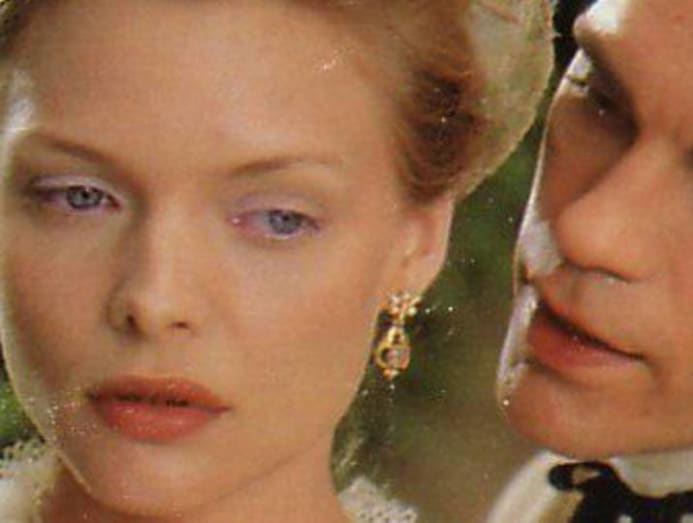
Yet while screenwriters and directors accept been dandy to mine his grapheme for their work, Malkovich has maintained a largely tranquillity personal life. After an unhappy brush with tabloids when his kickoff marriage ended and he was discovered to have had an matter with his Unsafe Liaisons co-star Michelle Pfeiffer, he left the Us. For years he lived in France with his partner of 30 years, Nicoletta Peyran, and their ii children.
His interests are far too eccentric to be gossip fodder. Equally well every bit acting and directing plays in multiple languages, he has joint ownership of a Lisbon restaurant, a fashion line and once received a commission to blueprint a Liberty print, something he calls "the big honour of my life". His function of the collection, inspired by 18thursday century chinoiserie, is called The Peacocks Of Grantham Hall and is pleasingly camp.
The suit he is wearing today is so singular that I wonder if it too is his own design but he says no, it came from a New York boutique called K Crow past "spectacularly gifted" furniture designer Tyler Hays, who makes everything – fabric, buttons, dye – by hand.
This preference for tradition and craft does non, still, make Malkovich a reactionary. Next yr he is due to announced in a Netflix comedy from Greg Daniels and Steve Carell, the people behind the US version of The Function. Companies such as Apple and Netflix moving into original production sends the conversation off on to another tangent on the nature of nostalgia and loss.
"I'm not the purist, as a lot of people are about cinema," he says. "I grew up in a picayune town and we certainly didn't accept good movies – we had kind of C movies. Sometimes you could come across the occasional Bridge On The River Kwai or something at the drive-in, where you were eaten alive by gigantic mosquitoes in the swamp."
Information technology was nice, he says, but he refuses to be sentimental nigh the changing ways in which people watch films. "If you live a long life, one of the things y'all nearly live is getting used to things that you never anticipated. And so what? Big deal."
When it comes to films or plays themselves, he quotes William Faulkner, his favourite writer, whose Nobel Prize acceptance speech encouraged writers to await across politics and create something new. "I tin can't name any skillful political fine art. I don't know what it means. Information technology may have been political at the time but let's say – I know the respond a lilliputian flake but permit's just say – why was (Rembrandt'southward) The Night Watch painted? Who paid for it? I don't know. The political story of information technology is long outlived past the man story and the artistry."
Malkovich is with Faulkner – stories of the human heart in conflict are the only ones worth telling.
"Perchance even tomorrow somebody volition invent some great political format which really provokes and allows discussion, as opposed to telling somebody what to think," he said. "I'g not interested in telling anybody what to remember."
By Elaine Moore © 2022 The Financial Times
Source: https://cnalifestyle.channelnewsasia.com/cna-lifestyle/being-john-malkovich-hollywoods-cool-villain-playing-pope-231856
0 Response to "Being John Malkovich: From Hollywood's cool villain to playing a pope"
Post a Comment